- Back to Home »
- Sharon's brilliant moves, tragic errors
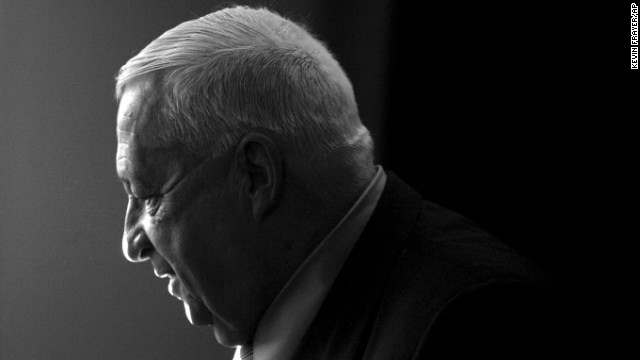 Former Israeli Prime Minister Ariel Sharon, a decorated warrior who also took steps for peace, died Saturday, January 11, after eight years in a coma. Sharon was 85. The former general suffered a stroke in January 2006 and has been hospitalized since. Here, he meets with Israeli journalists in Tel Aviv a month before the stroke.
Former Israeli Prime Minister Ariel Sharon, a decorated warrior who also took steps for peace, died Saturday, January 11, after eight years in a coma. Sharon was 85. The former general suffered a stroke in January 2006 and has been hospitalized since. Here, he meets with Israeli journalists in Tel Aviv a month before the stroke. 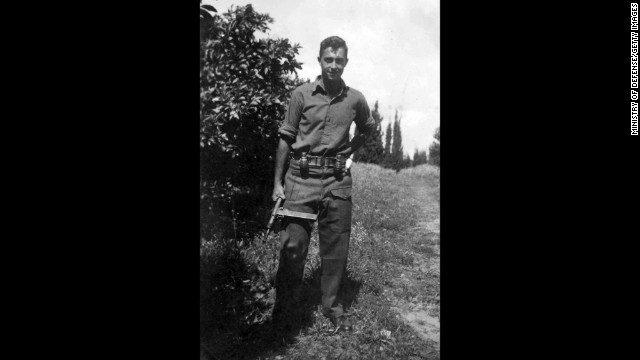 Sharon, born on a farm outside of Tel Aviv, began working with the Haganah, a militant group advocating for Israel's independence, after graduating from high school in 1945. He's shown as a young commander in the Alexandroni Brigade of the fledgling Israeli army in 1948.
Sharon, born on a farm outside of Tel Aviv, began working with the Haganah, a militant group advocating for Israel's independence, after graduating from high school in 1945. He's shown as a young commander in the Alexandroni Brigade of the fledgling Israeli army in 1948. 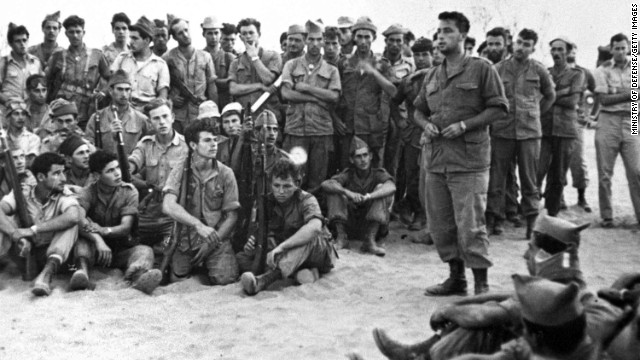 Ariel Sharon addresses troops of Unit 101 before their attack on Khan Yunis in what was formerly known as the Gaza Strip on August 30, 1955. Sharon had established the elite commando group two years before. The officer-turned-politician had a career marked with victories and controversies.
Ariel Sharon addresses troops of Unit 101 before their attack on Khan Yunis in what was formerly known as the Gaza Strip on August 30, 1955. Sharon had established the elite commando group two years before. The officer-turned-politician had a career marked with victories and controversies. 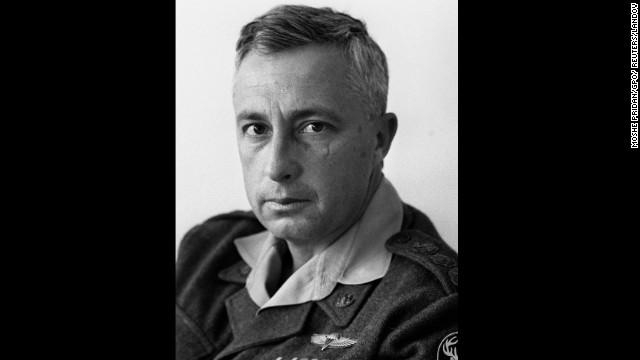 By February 1966, when this photo was taken, Sharon was an Israeli military hero. Sharon rose through the ranks of the Israel Defense Forces and was a major general during 1967's Six-Day War, which ended with Israel notably, if controversially, expanding its territory.
By February 1966, when this photo was taken, Sharon was an Israeli military hero. Sharon rose through the ranks of the Israel Defense Forces and was a major general during 1967's Six-Day War, which ended with Israel notably, if controversially, expanding its territory. 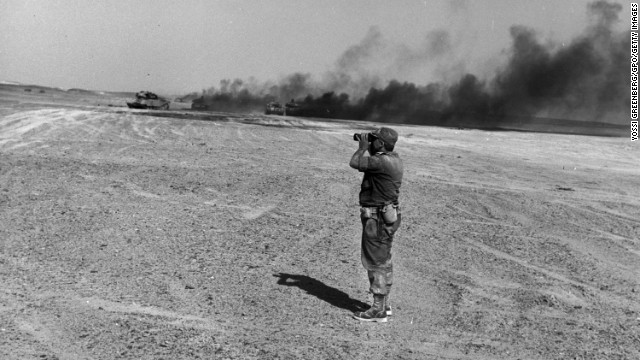 In June 1967, Sharon led his tank battalion to a crushing victory over the Egyptians in the Sinai during the Six-Day War. Here, he witnesses an aerial attack.
In June 1967, Sharon led his tank battalion to a crushing victory over the Egyptians in the Sinai during the Six-Day War. Here, he witnesses an aerial attack. 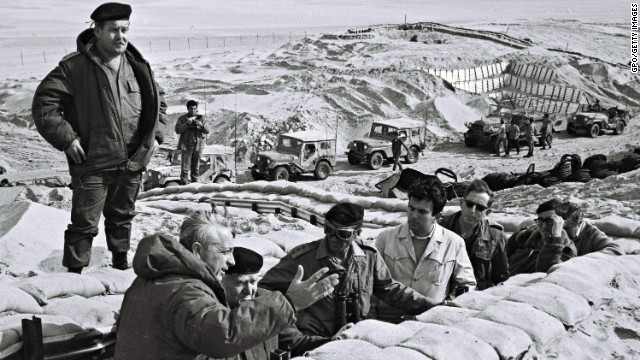 Former Prime Minister David Ben-Gurion is briefed in 1971 by Sharon in a trench near the Suez Canal in the Sinai.
Former Prime Minister David Ben-Gurion is briefed in 1971 by Sharon in a trench near the Suez Canal in the Sinai. 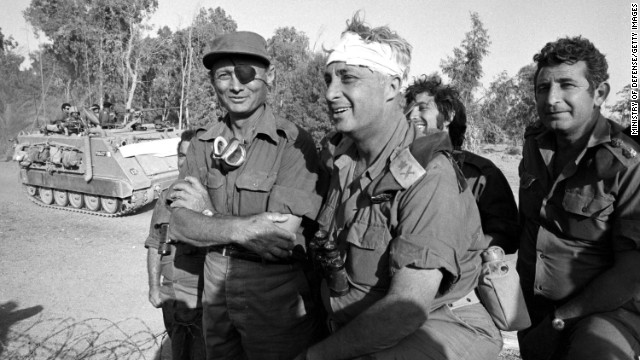 Defense Minister Moshe Dayan (left) visits with a bandaged Sharon during the Yom Kippur War in October 1973 on the western bank of the Suez Canal in Egypt. Sharon said his greatest military success came during that war. He surrounded Egypt's Third Army and, defying orders, led 200 tanks and 5,000 men over the Suez Canal, a turning point.
Defense Minister Moshe Dayan (left) visits with a bandaged Sharon during the Yom Kippur War in October 1973 on the western bank of the Suez Canal in Egypt. Sharon said his greatest military success came during that war. He surrounded Egypt's Third Army and, defying orders, led 200 tanks and 5,000 men over the Suez Canal, a turning point. 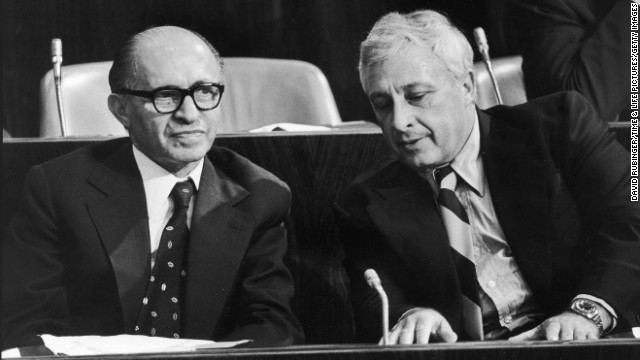 Sharon transitioned into government, including stints as military adviser, agriculture minister and defense minister. Here, he and Prime Minister Menachem Begin attend a Knesset meeting in June 1977.
Sharon transitioned into government, including stints as military adviser, agriculture minister and defense minister. Here, he and Prime Minister Menachem Begin attend a Knesset meeting in June 1977. 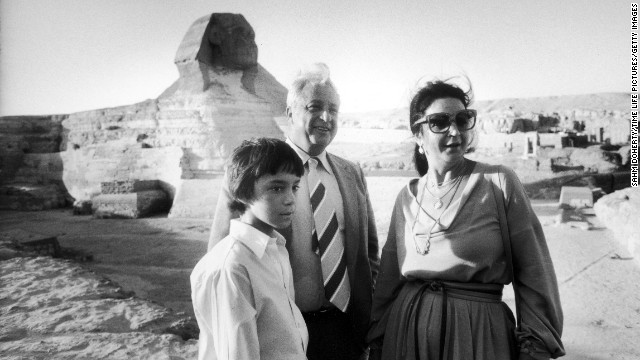 Sharon with his son, Gilad, and wife, Lily, during a stop in Egypt in 1979.
Sharon with his son, Gilad, and wife, Lily, during a stop in Egypt in 1979. 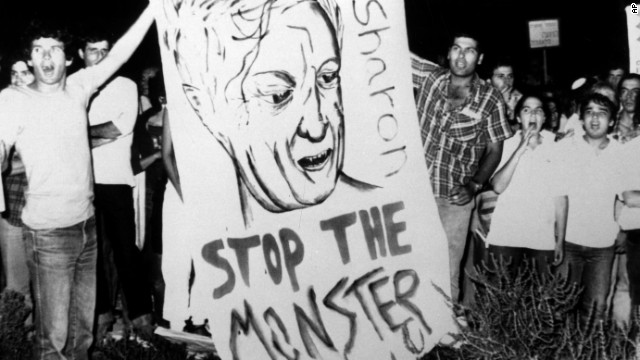 An official Israeli inquiry found Sharon indirectly responsible for the September 1982 killings of as many as 2,000 Palestinians at the Sabra and Shatila refugee camps outside of Beirut, Lebanon. The report -- which led to Sharon's prompt resignation -- determined the then-defense minister did nothing to stop Christian militiamen allied with Israel from entering the camps. Here, demonstrators are seen near Prime Minister Menachem Begin's home in Jerusalem, calling for the resignations of Begin and Sharon.
An official Israeli inquiry found Sharon indirectly responsible for the September 1982 killings of as many as 2,000 Palestinians at the Sabra and Shatila refugee camps outside of Beirut, Lebanon. The report -- which led to Sharon's prompt resignation -- determined the then-defense minister did nothing to stop Christian militiamen allied with Israel from entering the camps. Here, demonstrators are seen near Prime Minister Menachem Begin's home in Jerusalem, calling for the resignations of Begin and Sharon. 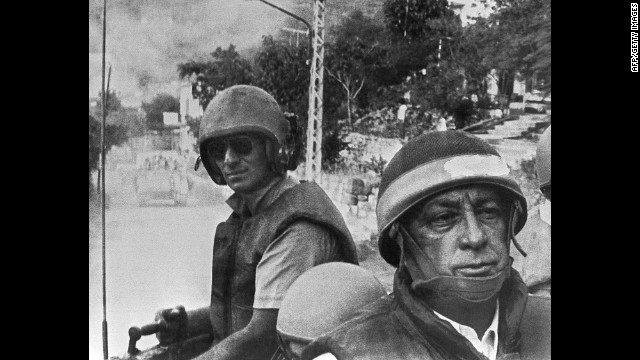 Israeli Defense Minister Ariel Sharon, in combat helmet and flak jacket, leads his troops toward a meeting with Christian forces in East Beirut in June 1982. Israel had invaded southern Lebanon in retaliation for an assassination attempt linked to the group Abu Nidal.
Israeli Defense Minister Ariel Sharon, in combat helmet and flak jacket, leads his troops toward a meeting with Christian forces in East Beirut in June 1982. Israel had invaded southern Lebanon in retaliation for an assassination attempt linked to the group Abu Nidal. 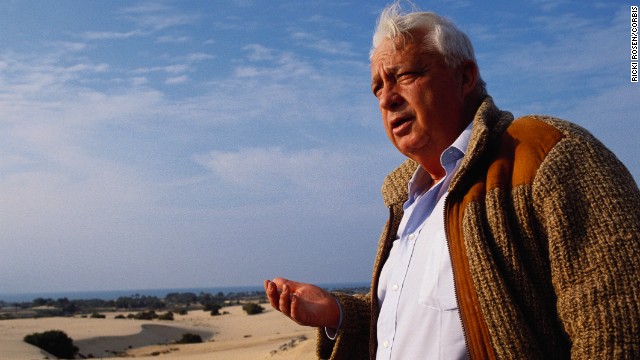 Sharon, no longer in the Israeli military, stands at the future site of a settlement in Gaza in February 1990.
Sharon, no longer in the Israeli military, stands at the future site of a settlement in Gaza in February 1990. 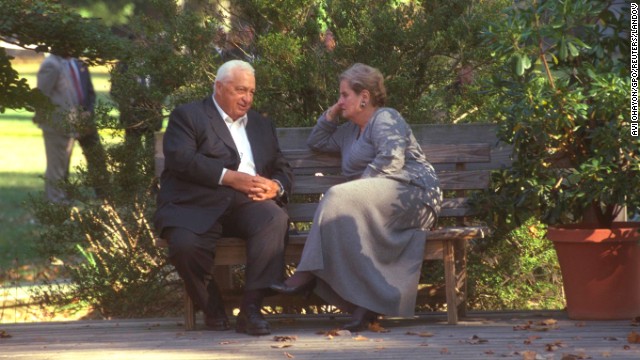 Serving as foreign minister, Ariel Sharon talks with U.S. Secretary of State Madeleine Albright during the October 1998 Middle East peace summit in Maryland.
Serving as foreign minister, Ariel Sharon talks with U.S. Secretary of State Madeleine Albright during the October 1998 Middle East peace summit in Maryland. 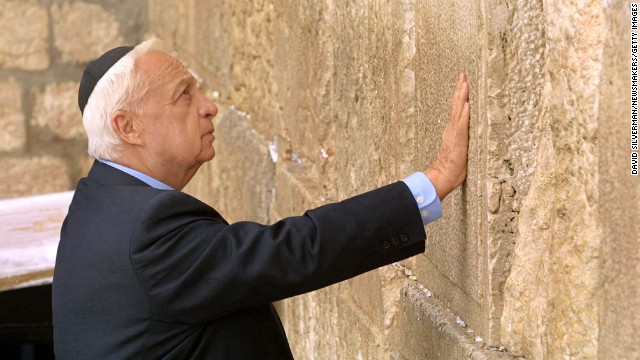 Sharon made a political comeback in the 1990s, eventually becoming leader of the Likud party in 2000. In February 2001, the prime minister-elect touches the ancient stones of the Western Wall as he prays at Judaism's holiest site in Jerusalem. He took office the following month.
Sharon made a political comeback in the 1990s, eventually becoming leader of the Likud party in 2000. In February 2001, the prime minister-elect touches the ancient stones of the Western Wall as he prays at Judaism's holiest site in Jerusalem. He took office the following month. 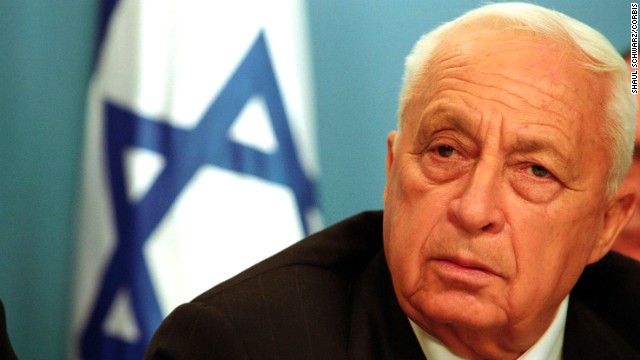 The prime minister, at a March 2002 media briefing in Jerusalem, announces a widespread army operation against what he called Palestinian terrorism. He spoke out against Yasser Arafat, then a key Palestinian leader. Sharon said that Israel considered Arafat an enemy and that he would be completely isolated "at this stage.''
The prime minister, at a March 2002 media briefing in Jerusalem, announces a widespread army operation against what he called Palestinian terrorism. He spoke out against Yasser Arafat, then a key Palestinian leader. Sharon said that Israel considered Arafat an enemy and that he would be completely isolated "at this stage.'' 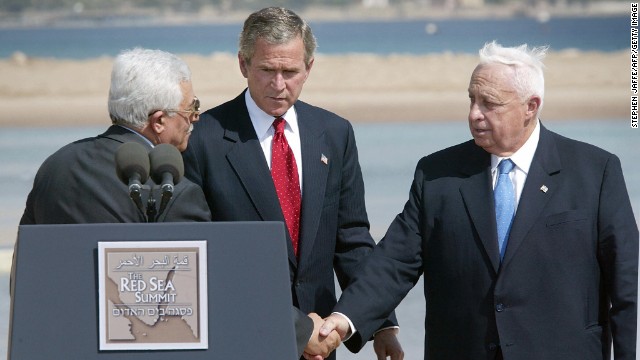 In June 2003, Sharon, right, met with Palestinian Authority leader Mahmoud Abbas, left, and U.S. President George W. Bush to discuss a Middle East "road map" for peace. After the meeting, Sharon expressed his "strong support" for a two-state solution to the Israeli-Palestinian conflict.
In June 2003, Sharon, right, met with Palestinian Authority leader Mahmoud Abbas, left, and U.S. President George W. Bush to discuss a Middle East "road map" for peace. After the meeting, Sharon expressed his "strong support" for a two-state solution to the Israeli-Palestinian conflict. 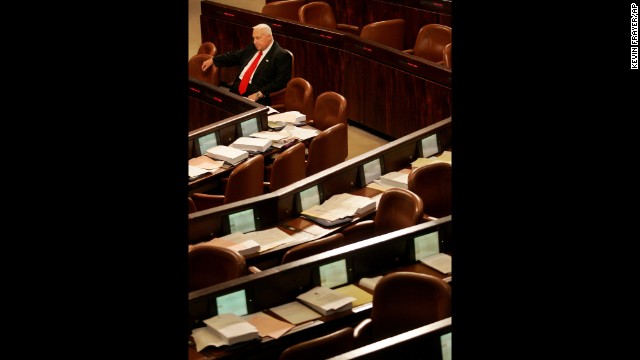 Sharon sits alone as he waits for other Knesset members to arrive for a vote on March 28, 2005. Sharon pushed for Israel's historic 2005 withdrawal from 25 settlements in the West Bank and Gaza, which was turned over to Palestinian rule for the first time in 38 years.
Sharon sits alone as he waits for other Knesset members to arrive for a vote on March 28, 2005. Sharon pushed for Israel's historic 2005 withdrawal from 25 settlements in the West Bank and Gaza, which was turned over to Palestinian rule for the first time in 38 years. 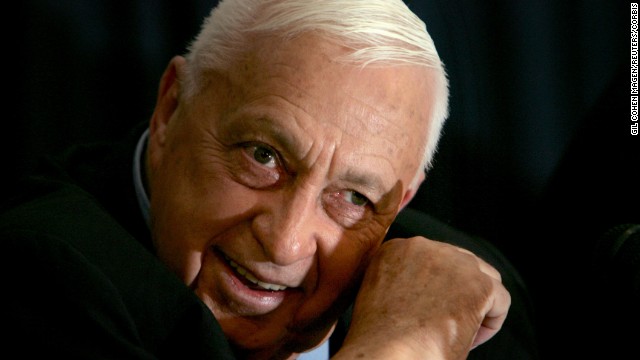 Immediately after he fell ill in early 2006, Sharon's prime minister power was transferred to Vice Premier Ehud Olmert. Sharon is shown only weeks before his devastating stroke.
Immediately after he fell ill in early 2006, Sharon's prime minister power was transferred to Vice Premier Ehud Olmert. Sharon is shown only weeks before his devastating stroke. 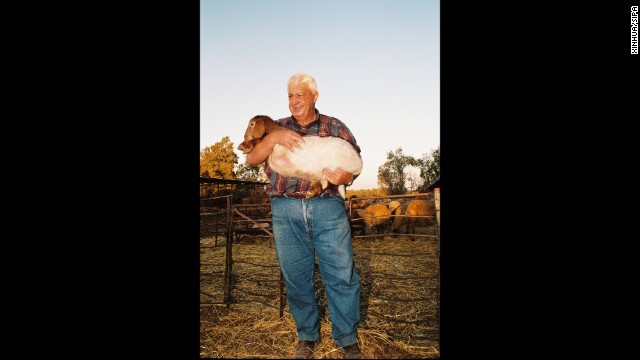 The politician pays a visit to his Negev Desert farm in early 2006.
The politician pays a visit to his Negev Desert farm in early 2006. 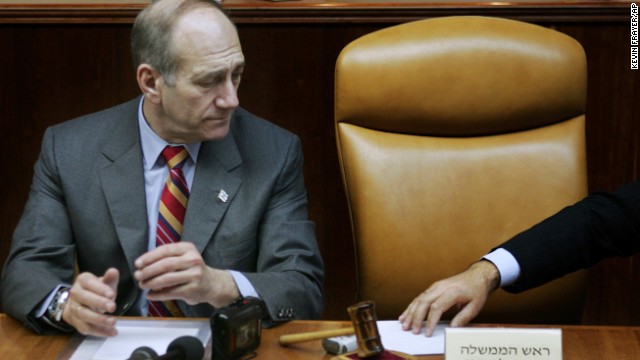 Acting Prime Minister Ehud Olmert looks toward the empty chair of Prime Minister Ariel Sharon as a note is passed to him during a special meeting of the cabinet in April 2006. Israel's Cabinet declared Sharon permanently incapacitated, a decision marking the official end of his five-year tenure. Sharon suffered his stroke in January 2006 and was in a coma.
Acting Prime Minister Ehud Olmert looks toward the empty chair of Prime Minister Ariel Sharon as a note is passed to him during a special meeting of the cabinet in April 2006. Israel's Cabinet declared Sharon permanently incapacitated, a decision marking the official end of his five-year tenure. Sharon suffered his stroke in January 2006 and was in a coma. 
1

2

3

4

5

6

7

8

9

10

11

12

13

14

15

16

17

18

19

20
- Frida Ghitis: Ariel Sharon reflected the history of Israel -- its trauma and its creativity
- He took bold, risky action and made brilliant moves and disastrous mistakes, she says
- Ghitis notes Sharon's military wins, his reckless decision that ended in a massacre
- She says at end of his career, he broke with hard-liners and sought solutions to conflict
Editor's note: Frida Ghitis is a world affairs columnist for The Miami Herald and World Politics Review. A former CNN producer and correspondent, she is the author of "The End of Revolution: A Changing World in the Age of Live Television." Follow her on Twitter @FridaGhitis.
(CNN) -- If you can define Ariel Sharon's legacy in one line, citing just one of his dramatic actions, then you have missed most of the man.
The former Israeli prime minister led a life that looks much like the history of his country, filled with trauma, heartbreak, creativity, bloodshed and transformation. He aroused intense hatred from his enemies and profound admiration from his followers. He had strong opinions, took bold, risky actions. He made brilliant moves and disastrous mistakes.
Sharon stood at the center of the greatest disputes, the most feverish controversies in the country's history. And then he stunned the world with a radical change of heart.

The brazen right-wing hardliner remains a target of hatred for many in the Arab world. And yet, when he suffered a devastating stroke in 2006, he had undergone a breathtaking political conversion. Once a major proponent of the plan to build Jewish settlements in territories captured during the 1967 Six Day War, he had decided it was time for Israel to withdraw from much of the territory.
As he told the New York Times' William Safire in 2004, he didn't believe the Palestinian leaders would respect a peace agreement, but he didn't want Israel to rule over millions of Palestinians. So, he said, "I discussed this between me and myself and came up with a new initiative." Initially, nobody liked his idea very much. "In Israel, the right does not like me to do it, and the left cannot do it," he said, "but you don't wait forever."
Despite bitter protests from his former allies and stiff resistance from the settlers, he carried out the "Disengagement" in 2005, removing every single settler and every Israeli soldier from the Gaza Strip. And he cryptically spoke of more "painful compromises" to come. "We yearn for peace with our neighbors," he said to Israelis, "even at the price of painful concessions." There is every reason to believe he was preparing to withdraw Israeli settlements from much of the West Bank, as well.
Had Sharon stayed in office, the Israel-Palestinian conflict would look very different today.
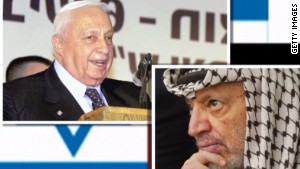 Sharon and Arafat: Enemies to the end
Sharon and Arafat: Enemies to the end 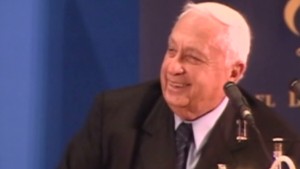 Ariel Sharon: The politician
Ariel Sharon: The politician 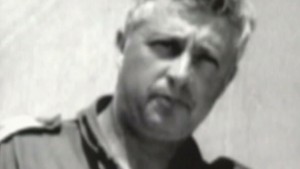 Ariel Sharon: The warrior
Ariel Sharon: The warrior Sharon embodied the Israeli dilemma of how to obtain peace while maintaining security. As he had predicted years earlier, the withdrawal from Gaza ultimately turned the territory into a launching pad for attacks against Israeli towns. And yet, few Israelis wish their country still occupied the Strip.
The larger-than-life prime minister helped his country survive in a deeply hostile region, where Israel's neighbors made it clear from the day the state was founded that they would find it the happiest of outcomes if the Jewish state would cease to exist. But he also drove Israel into terrible quagmires.
Barely 20 years old in 1948, he sustained multiple injuries fighting in a war against half a dozen Arab countries, which attacked the moment Israel declared its independence.
In 1973, when Egyptian and Syrian armies crossed into Israel on Yom Kippur, while much of the country was fasting for the calendar's holiest day, Israel appeared at risk of falling. Egyptian forces were headed for Tel Aviv. It was Sharon who devised and executed a plan to cross the Suez Canal, cut off and encircle part of the Egyptian army, a plan that helped Israel win the war and pave the road to peace.
He suffered head injuries in battle but kept on fighting. Pictures of Sharon with his head bandaged while winning the war became iconic, a metaphor for a country battered, creative, resilient.
He was the defense minister who carried out the withdrawal of all Israelis, including settlers, from the Sinai Peninsula in exchange for peace with Egypt.
The darkest, most destructive chapter in Sharon's life unfolded in Lebanon in 1982 when he was defense minister. It is by that chapter that most Arabs remember him. Back then, Israeli civilians were coming under constant attack from the Palestinian Liberation Organization, the PLO, which had become a state-within-a state inside Lebanon. Sharon launched an invasion to remove the PLO, allying Israeli forces with Lebanon's Christian militias, the Phalangists.
Israeli forces allowed Phalangist fighters to enter the Palestinian refugee camps of Sabra and Shatilla in Beirut to clear out Palestinian militias. Instead, the Phalangists committed horrific massacres of civilians.
Contrary to what many believe, Sharon had no knowledge that the massacres would occur. An Israeli commission of inquiry found that despite previous excesses by the Christian militias, Israel had concluded that Phalangist forces had reached a stage of maturity that would "ensure that such actions would not repeat themselves." Given the sectarian passions, it was reckless to allow the Christian militias into the camp.
The Israeli inquiry headed by the country's President of the Supreme Court, the Kahan Commission, found Sharon bore "personal responsibility" and recommended his removal from office. Israelis were seething at him and their government. He rejected the charges and refused to step down. Israeli peace activists launched protests to push for his removal. When a hand grenade was detonated in one demonstration, killing an Israeli protester, Sharon finally stepped down. Eventually, Sharon rose again.
He had never cared much what people thought about him and was never one to follow ideological fashion. That was probably a result of his childhood. When he was born in 1928, his parents had settled in a socialist farming community, but rejected their neighbors' views on communal living. Sharon and his family were outsiders in their own home. He learned to think for himself and follow his instincts rather than the crowd.
He had reached the height of his career in 2006 when it suddenly ended from a massive stroke that put him in a coma.
Before his illness, Sharon had found a new path. He broke with his rightist party, the Likud, in a rift that put him on the opposite side of other hardline stalwarts such as today's Prime Minister Benjamin Netanyahu. Sharon created the Kadima (forward) party ahead of elections he was poised to win in a landslide.
When he was incapacitated, Kadima won. His deputy Ehud Olmert became prime minister and carried on with peace talks, which ultimately foundered. Sharon had hand-picked Tzipi Livni to join him in Kadima. She is now a leading advocate of concessions for peace and member of Israel's negotiating team.
Despite his missteps, Israelis trusted Sharon as a strong defender of their security. That meant that when he was prepared to take risks for peace, they were ready to join him. That's why he won elections while vowing to undertake "painful compromises." That's why it was so demoralizing when he suddenly left the stage. Israelis, including Netanyahu, know that peace will not be possible without some risk-taking. The question is the extent of the danger they are prepared to accept.
His life showed the complex link between security, peace and politics. And he showed once again that it is often the fiercest warriors who take risks for peace. It was another Israeli right-wing leader, Menachem Begin, who made peace with Egypt. It was Yitzhak Rabin, a respected general, who shook hands with Yasser Arafat on the White House lawn.
It was Sharon, an architect of the settler movement, who said settlements had to be removed. He left a complicated legacy, defending his country from those who would destroy it, and taking on those who disagreed with his controversial views at home.
Follow @CNNOpinion on Twitter .
Join us at Facebook/CNNOpinion .
The opinions expressed in this commentary are solely those of Frida Ghitis







